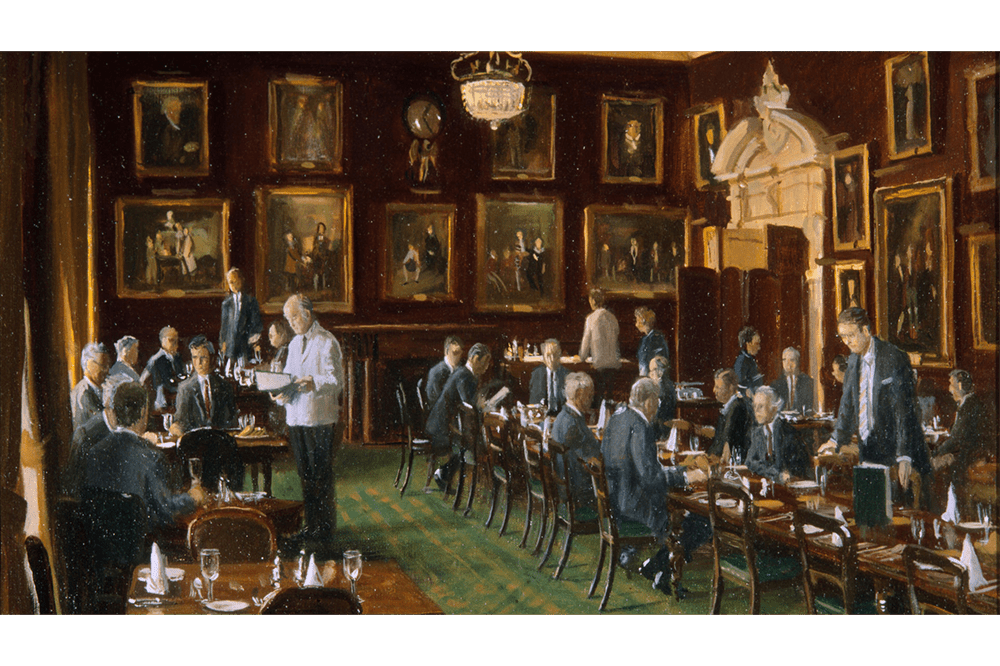I’ve always had a soft spot for the Garrick. Named after an 18th-century theatrical impresario, it was established in 1831 as a club where ‘actors and men of refinement and education might meet on equal terms’, and in the intervening years it has admitted members of other equally disreputable professions – lawyers, writers, surgeons, journalists. I was put up myself about 15 years ago, but blackballed by the chair of the catering committee who took exception to a throwaway remark I’d made about the food. I intend to reapply, but will probably be blackballed again on account of the argument I’m about to make in defence of the club’s ‘men only’ membership policy.
Why am I against admitting women? Firstly, they’re already allowed in as guests and can enjoy almost all the same services as members
You might think that would endear me to the crumbling pillars of the British establishment, but no. A recent members’ poll revealed a majority are in favour of admitting women, but not because the club’s make-up is becoming more ‘progressive’ as the old guard dies out. Seth Alexander Thévoz, author of a book about London clubland, told the Guardian that ‘the younger members in historic clubs can be among the most traditionalist… whereas it’s often the older members who are rather more liberal’.
That analysis is borne out if you compare the results of the poll with the last time the members voted on this issue eight years ago. Then, too, a majority were okay with admitting women, with Damian Lewis, Hugh Bonneville and Stephen Fry among the 50.5 per cent in favour. That’s almost identical to the number of ‘modernisers’ in the recent survey, 51 per cent, suggesting the changing composition of the membership isn’t moving the dial. The club’s constitution requires any rule change to be approved by a two-thirds majority, so the next time a motion is put forward on this issue it’s unlikely to be carried.
In 2020, a lingerie tycoon called Emily Bendell threatened to challenge the policy in court, claiming it was a breach of the Equality Act 2010, but didn’t follow it through. According to m’learned friends, a discrimination claim would probably fail because the Equality Act includes a carve-out for single-sex institutions, such as women-only choirs and men-only rugby clubs. Insofar as the Act creates any wiggle room on this issue, that loophole is likely to be closed by the current government so the parents of trans-identifying boys cannot sue their schools for refusing to give them access to the girls’ changing rooms. It’s also worth bearing in mind that if an Equality Act challenge against the Garrick succeeded, it would also spell doom for women’s private members’ clubs such as the
AllBright, not to mention ladies’ gyms, spas and swimming pools. Not an unqualified victory for feminism.
Some of the leading radicals in the Garrick recently persuaded Max Beloff KC to change his mind about how to interpret the club’s membership criteria, which state ‘no candidate shall be eligible unless he be proposed by one member and seconded by another’. Back in 2011, Beloff pointed to the word ‘he’ to justify excluding Joanna Lumley, who’d applied to join. But now he’s done a U-turn, citing a recent precedent that apparently allows the courts to treat the word ‘he’ in ancient rule books as interchangeable with ‘she’. Nevertheless, this is unlikely to be decisive, as any legal challenge could be traced back to the reforming faction, and by trying to force the issue rather than allowing a ballot, they would damage their cause.
So why am I against admitting women? Firstly, they’re already allowed in as guests and can enjoy almost all the same services as the members with the benefit of not having to pay for them. This gives the lie to the argument that professional women are being denied access to smoke-filled rooms where appointments and promotions are made. If women really were banned from the Garrick, no ambitious man would dare to be a member lest it blot his copybook with his firm’s equity, diversity and inclusion officer. Being a member of a club that refused to admit women would be a huge handicap.
The argument is not about whether to allow women to become members, but whether the Garrick or any other private club should continue to enjoy freedom of association. There’s no evidence women are being harmed by the club’s membership policy. On the contrary, diluting the legal right to exclude people of the wrong sex from single-sex institutions would end up hurting women more than men, as women’s refuges and the like would be forced to admit trans women. If two-thirds of the Garrick’s members want to change the policy, that’s their prerogative. But it should be their decision, not anyone else’s.







Comments